- Home
- Thomas H. Cook
The Crime of Julian Wells Page 6
The Crime of Julian Wells Read online
Page 6
“For a little while,” I said. “But I’ll stay in touch. With Skype, we can even see each other. And if anything . . . comes up, I can fly back in no time.”
“Of course,” my father said, though he was clearly reticent to see me go, feeling vulnerable as old people inevitably do.
“I have to do this, Dad,” I said.
My father smiled, then reached over and touched my hand. “I can see that,” he said. Something inexpressibly sad drifted into his eyes. “It’s a good thing to have a mission.”
I considered all the futile missions my father had undertaken. He’d worked for fresh water in lands ravaged by cholera, for regional clinics in jungle redoubts, for irrigation in regions made barren by drought. In every case, as he’d long ago admitted, he’d been thwarted by the “big picture” at the State Department, global strategies of containment, domino theories, the specter of mutually assured destruction.
“Yes,” I said, then changed the subject, and for the next hour or so we talked of old films he’d watched on television lately. In addition to Westerns and spy movies, he’d begun to watch the noir movies of the forties, Humphrey Bogart and Alan Ladd, and when he spoke of them I could hear a strange longing in his voice, his old desire to be a man of action still pursuing him and accusing him and tainting his memory with failure.
“Do you want to watch a movie?” I asked in hopes of stopping the downward slant of his mood.
“No,” my father answered. He seemed to go deep inside himself, then return slowly, like a diver resurfacing. “It’s the dusty people, Philip, too small for us to notice,” he said, “the little dusty people who bear the brunt of our mistakes.”
His mood was quite obviously descending, so I gently urged him toward his youth, and for the next few minutes he talked rather nostalgically about his own father, then his college years, then about my mother, who, like my own wife, had died before her time.
“You should be getting home now,” he said at last. “I could go on for hours.”
“Yes, I probably should,” I said.
My father looked like one who’d once been offered a mission not unlike my own, but had either refused it or failed to achieve it. “Good luck,” was all he said.
7
There is no substitute for meaning, and the luckiest of us are those who have felt the spur of a grave commitment. I couldn’t possibly include myself among the men who hung in dark frames from the walls of my father’s apartment. They had been warriors and diplomats, and a few, as my father had once reluctantly admitted, had been spies. I knew that my own life would never be as charged with mission as theirs. Even so, that map of Argentina, the grim fact of Marisol’s disappearance, and finally Julian’s curious mention of some crime I had witnessed—his crime—had joined together to provide a purpose to my going to Paris that was larger than any I had known in a long time.
This purpose was still in my mind when I got back to my apartment.
I poured a glass of brandy, took my usual seat at the window, and looked out over the park, a glance into the night that loosened the bonds of recollection, and took me back to Berlin with Julian more than twenty years before.
He’d gone there in an effort to track down and interview some of the surviving German soldiers who had massacred the villagers of Oradour-sur-Glane in June of 1944. He had decided to write an account of this atrocity, and on the train from Paris to Berlin, he’d gone through its terrible details.
He was twenty-seven at the time, and although we had regularly exchanged letters, it had been well over a year since I’d seen him. By then, a certain texture had been added to him by his travels and his studies, and his voice bore a gravity that I associated with the knowledge and experiences he had accumulated since last we’d met.
“So, how is the new book coming?” I asked him.
“Oradour is hard to write about,” he said.
His eyes were still blue, but their shade seemed deeper, though I doubt their color had actually changed. Still, there was an incontestable depth in those eyes, something that spoke of the charred village whose tragedy he had chosen as the subject of his next book.
“Yes, it was terrible what happened at Oradour,” I said.
“I don’t mean that it’s hard to write about in that way,” Julian said. “It’s that there’s a kind of voyeurism involved, a peep-show quality.”
I looked at him, puzzled, and at that instant, the train entered a tunnel that threw us into shadow, so that we sat in silence, rumbling on, until the train passed out of the darkness and we were bathed in light again.
Something in Julian’s face had changed. It was as if, during the brief darkness of the tunnel, some other, deeper darkness had fallen upon him.
“The pain of others should not be made thrilling,” he said softly. “There should be no intellectual sadism in reading about Oradour.”
Had that been the moment when it first occurred to him to write his book as he’d later written it? I wondered now.
One thing was clear: In The Eyes of Oradour, Julian had focused exclusively on the victims, all 642 of them, each given a single page to bear witness, a kind of Spoon River Anthology for the members of that murdered village. That was the magisterial oddity of the book, the way Julian had managed to see the massacre through the eyes of those who’d suffered it. To write of the atrocity at Oradour in so strange a way had been a brave choice, and at times—when a little girl used her own body to shield her doll from the attack, for example—he had brought a heartrending vividness to the victims’ deaths.
But in that same narrative, he’d refused to name either the men who ordered the massacre or those who carried it out. Even as unnamed figures, the Germans are glimpsed only at quick moments when the crowd breaks and the back of a soldier, or perhaps only a boot or uniformed leg, is glimpsed in what amounts to a photo flash. At other times the soldiers are disembodied voices, shouting commands or gently deceiving the villagers of Oradour as to their real intent. In other instances, they appear only as the blurry hint of a figure, a brushstroke of helmeted gray.
On the whole, I thought the book extraordinarily accomplished, worthy of the many years it had taken Julian to write it, though a few reviewers had complained that he had concealed the methodical human agency behind the massacre too much, making the innocent of Oradour seem less like the victims of actual cruelty than of the touching down of a storm.
At the time, even though I greatly admired the book, I also thought this criticism not altogether unfair. It was a monumental crime, after all, and Julian had determinedly concealed the men who had carried it out.
Why had he done that?
We were sitting on a bench behind the great library on Fifth Avenue when I posed that very question. It was winter, and we were both wrapped in our overcoats. It had snowed the day before, and the bare limbs of the trees were laced in white. Julian remained silent for a long time before explaining why he hadn’t identified any of the German soldiers. “They deserve to be forgotten,” he said, as if shielding the murderers had been one of the book’s metaphorical devices. “It’s the innocent who deserve to be remembered.”
“But don’t you think the perpetrators need to be remembered, too?” I asked.
He turned to me and something in his eyes told me that this was a subject that pained him.
“What would be the point of telling some little boy that on a particular day, in a particular place, his father was complicit in a terrible crime?” he demanded. “What good would come of it?”
“But otherwise the father would get away with it,” I answered. “And a man who does a terrible thing should be identified.”
Julian gave no response, so I hammered home the point.
“Like whoever killed Marisol,” I added because the unsolved crime of her disappearance suddenly occurred to me. “He got away with it.”
One of Julian’s gloved hands wrapped around the other. “Yes,” he muttered.
He seemed so abruptly moved by the mention
of Marisol that I quickly added, “You did your best to find her, Julian.”
Then, to change the subject, I glanced at the book peeking out from the pocket of his coat.
“What are you reading?” I asked. He drew the book from his pocket and I looked at the title, quite surprised by what I saw.
“Eric Ambler, I see. So, you’re reading spy fiction now?”
“It helps to pass the time,” Julian said.
“Betrayal and false identities,” I said jokingly. “People who are not what they appear. Thrilling stuff,” I added with a laugh, “but not the stuff of great literature.”
“You might be surprised,” Julian said softly. “Life is a shadow game, after all.”
I absently opened the book and saw that he’d underlined its most famous line. “It’s not who fires the shot,” I read, “but who pays for the bullet.”
He removed the book from my hands and returned it to his pocket. “It helps to pass the time,” he repeated. “And I don’t read Borges anymore.”
Borges, I thought, and felt the dust of the Chaco settle over us once again, a place I’d never seen, but which our guide had called home.
Borges.
A sure sign, I knew, that Julian’s mind remained on Marisol.
8
In the great tales, she is always beautiful, of course, the one whose loss torments a man. Since Helen walked the ramparts of Sparta and equally dazzled the men of two opposing armies, we have given little value, in literature at least, to a plain-looking girl.
That is not to say that Marisol was plain, but simply to say that she was by no means a dazzling Helen or a fiery Antigone. She was Cordelia, the loyal daughter of King Lear, quiet, modest, motionless at her center, a pendulum at rest.
She came into the lobby of the hotel like a small breeze off the pampas, the sort that barely moves the grasses.
“I am Marisol,” she said in her softly accented English. “I am pleased to meet with you.” Her eyes were black, but striking, and her skin brown, but with a golden undertone, so that in a certain light, as Julian once observed, she seemed carved from a muted amber.
A week before, my father had contacted the American consulate in Buenos Aires, and someone in that office had recommended Marisol as a guide. She was fluent in English, according to the consulate, and others had been satisfied with her services. With a slightly comic edge, my father had added that Marisol had been properly vetted by the consulate, which meant, of course, that she was no female Che Guevara.
On that first morning, she wore a dark gray skirt that fell just below the knee, with a matching jacket. Her blouse was white, with a tailored collar, and she wore it open at the throat. The shoes were black and well polished, with a modest, businesslike heel. But such gestures toward urbanity did not conceal the depth of her indigenous roots. These were in the oval shape of her eyes and the width of her nose and the black panther sheen of her hair. Europe had made no invasion of her blood. For that reason one sensed in her, as I’m sure Julian did, a strange and unconquerable purity.
“I welcome you to Buenos Aires,” she added with a quick smile.
Where many of the women of the city wore a crucifix on a gold or silver chain, Marisol wore a simple string of wooden beads. From the beginning, Julian said, there was a no-nonsense quality about her, something steady, down-to-business, and in a way profoundly conservative, a brick in the sturdy wall, as he would later write of those who resist the excesses of revolutionary fervor, that slows the violent winds of change.
Julian offered his hand. “I’m Julian Wells, and this is Philip Anders.”
“Un placer,” Marisol said as she shook our hands. “I will teach you a little Spanish while you are here.” She gave each of us an evaluating glance. “That is okay?”
“Absolutely,” Julian told her. “Right, Philip?”
“Of course.”
She swept her arm toward the entrance to the hotel. “Come then. There is much to see in Buenos Aires.”
The day’s tour began with a long walk that took us from Casa Rosada all the way to La Boca, by which Marisol hoped, as she said in one of her rare misuses of English, “to integrate us.”
She was a woman of extended silences, I noticed, and she said very little as we walked the streets of La Boca, looking at its brightly colored houses. It was as if she understood that quiet observation was the key to knowing a place, perhaps even the key to life. In any event, she was careful to allow space for standing, sitting, seeing, so that we never felt rushed. Nor did she engage in the guidebook patter that can be so annoying. Marisol, as I would come to understand, was a shaded pond, calm and unruffled.
By evening we had found our way back to the hotel. The restaurant, Marisol said, had a good reputation, though she had never eaten there.
We took a table outside. It was early evening, that twilight interval between a city’s working day and its nocturnal life.
“By the way, where are you from?” Julian asked her at one point.
“I was always moving between Argentina and Paraguay,” Marisol answered. “I crossed this border many times as a child.”
“Why?” I asked.
“When my mother died, I was sent to my father in Paraguay,” Marisol answered. “At this moment, my father died, and I was sent to an aunt back in Argentina. When she was also dying, she took me to a priest, and it was this man who cared for me.”
The priest had lived in a part of northern Argentina that bordered on the Gran Chaco.
“It is very dry, with nothing, and for many years no one cared about it,” Marisol informed us. “Then they found oil.”
It was the struggle to possess this oil that had generated the Chaco War, she said, a conflict that had been unimaginably brutal.
“They died in great numbers, the soldiers,” she said. “So much sickness, and no doctors. You have not heard of it, this war?”
“No,” Julian answered.
Marisol didn’t seem surprised. “We are unknown to you, we who live down here,” she said. “To you, we are fallen off the earth.”
A silence settled over her, both somber and serene, from which emerged what seemed to be the central hope she had for her people, their one quite justified aim.
“All we want is a fighting chance,” she added softly.
Then her eyes abruptly brightened and she was our professional guide again.
“You must have a taste of Argentina,” she said. “Of our wine. It is called Malbec, and the difference in taste between the cheap and the not cheap, it is not so big.” She smiled softly, but it seemed an actress’s smile. “You will like it, I think. But just in case, you should order the cheap one.”
Only once more during that day did Marisol again leave her role as cheerful, uncomplicated guide. It was in answer to Julian’s question about her feelings concerning the current state of Argentina, then in the final throes of its Dirty War.
In response, Marisol’s gaze grew tense. “Here we say that Argentina es un país perdido,” she said softly. “A lost country.” She shrugged. “And we have another saying. A funny answer when we are asked how we are doing.” She glanced about to make sure she could not be heard, then whispered, “Jodido pero contento.”
“What does that mean?” I asked.
She was suddenly hesitant. “I do not wish to be vulgar.”
“Oh, come on, Marisol,” Julian said. “We’re all adults here.”
“Okay,” she said, then laughed. “It means ‘screwed but happy.’”
We parted at around nine that evening, then met again the next morning, mostly for a tour of various museums, during which Marisol was very much the professional guide, talking of this artist or that one in the fashion of a museum brochure. There were also walks along the canals, a visit to Teatro Colón, Buenos Aires’s famed opera house. Our third day involved a ferry to Montevideo followed by a boat ride to the estuary where the Germans had scuttled the Graf Spee in December of 1939. Marisol was surprisingly kno
wledgeable and knew the exact coordinates beneath which the doomed vessel lay.
“The English tourists like to come here,” she told Julian by way of explanation. “Sometimes the Germans, too. So I discovered where it is and we are now exactly at this place.” She smiled brightly. “Knowing such a thing makes me a better guide, no?”
On the fourth day Marisol took us to the cemetery in Recoleta.
“This is a very quiet place,” Marisol said as she led us beneath the dazzlingly white arched entrance.
For a time we wandered silently among the mausoleums, moving slowly, but without a stop, until we reached Evita’s tomb.
“Eva Perón was a poor girl,” Marisol said softly when we paused before it. “Just another poor girl from Los Toldos.”
“Would you have voted for her?” Julian asked.
Marisol shrugged. “Now there is no voting here,” she said. “It is only between two bad things that we must choose.” She peered at the small plaque attached to the tomb. “Sometimes, when I bring the people here, I tell them what Borges said about life,” she went on. “This adds to me as a guide.”
“What did Borges say?” Julian asked.
Marisol, honest to the quick, said, “The English, it is not my translation.”
“Still, I’d like to hear it,” Julian insisted.
Marisol summoned this translation that was not hers, then said, “Okay, Borges said: ‘Our time on earth is divvied out like stolen things: a booty of nights and days.’”
Her eyes darkened slightly, and then, as if by an act of will, they brightened again, though this time something behind them remained in shadow. “Come,” she said. Then, very quickly, she turned and headed out among the tombs. “Come,” she repeated as she waved us forward. “A guide should be always smiling.”
She had only contracted for a set number of hours each day, but she went off the clock at six that evening, so we remained in the restaurant for a long time. We had dinner, then strolled along Calle Florida for a time, where we stopped to watch a couple of street performers dance the tango.

 The Interrogation
The Interrogation Sacrificial Ground
Sacrificial Ground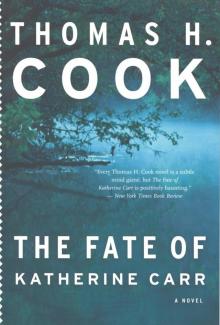 The Fate of Katherine Carr
The Fate of Katherine Carr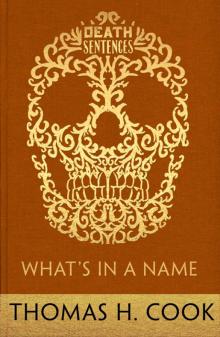 What's In A Name
What's In A Name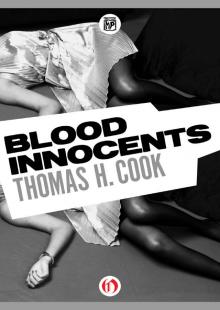 Blood Innocents
Blood Innocents Peril
Peril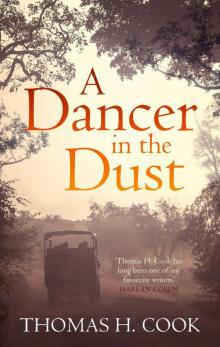 A Dancer In the Dust
A Dancer In the Dust Breakheart Hill
Breakheart Hill The Chatham School Affair
The Chatham School Affair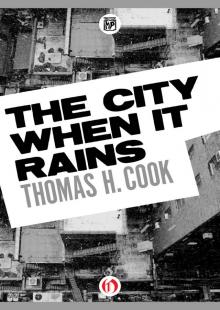 The City When It Rains
The City When It Rains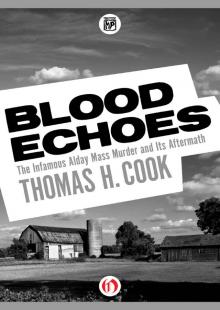 Blood Echoes
Blood Echoes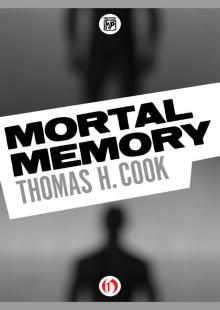 Mortal Memory
Mortal Memory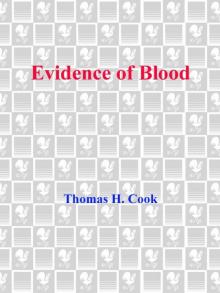 Evidence of Blood
Evidence of Blood Into the Web
Into the Web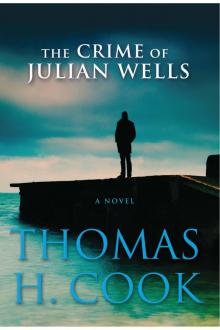 The Crime of Julian Wells
The Crime of Julian Wells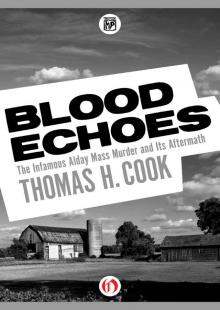 Blood Echoes: The Infamous Alday Mass Murder and Its Aftermath
Blood Echoes: The Infamous Alday Mass Murder and Its Aftermath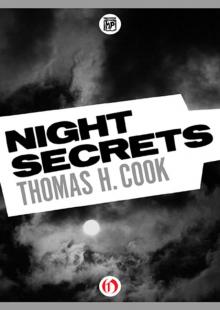 Night Secrets
Night Secrets Places in the Dark
Places in the Dark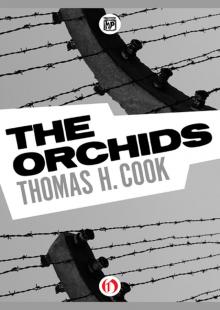 The Orchids
The Orchids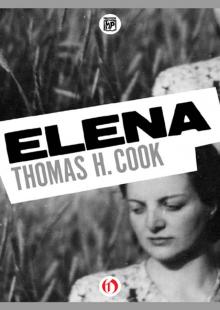 Elena
Elena Streets of Fire
Streets of Fire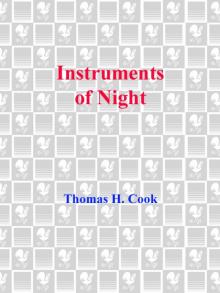 Instruments of Night
Instruments of Night Sacrificial Ground fc-1
Sacrificial Ground fc-1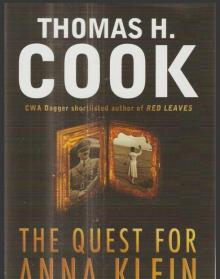 The Quest for Anna Klein
The Quest for Anna Klein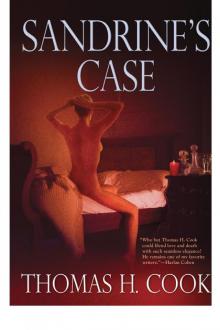 Sandrine's Case
Sandrine's Case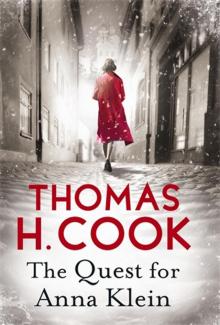 Quest for Anna Klein, The
Quest for Anna Klein, The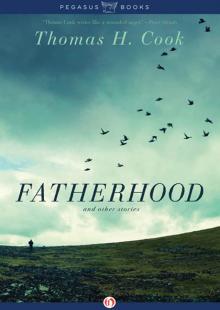 Fatherhood
Fatherhood Flesh and Blood
Flesh and Blood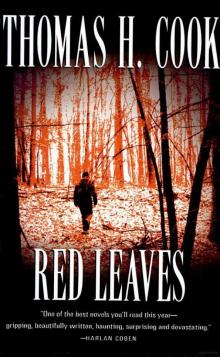 Red Leaves
Red Leaves